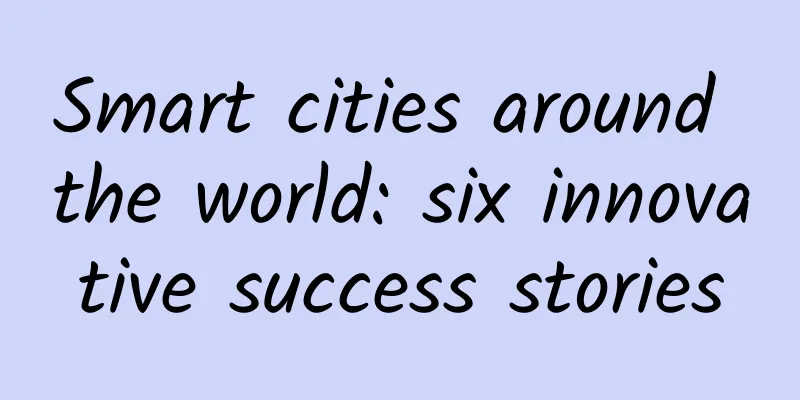Smart cities around the world: six innovative success stories

|
It is estimated that at least 180,000 people worldwide move to cities every day. Based on this assumption, and considering that the world population is expected to increase significantly by 2050, when the planet will most likely be inhabited by approximately 9.7 billion people, compared to the current 7.7 billion, the role of smart cities becomes even clearer. Smart cities are emerging not only to improve livability for citizens, but also for sustainability issues. In fact, one of the key challenges facing smart cities is to use digital transformation to provide a specific response to the huge global urbanization challenges: from population growth to energy efficiency, from resource scarcity to reducing greenhouse gases in the atmosphere. But which cities in the world today can be defined as the smartest? Today, let’s take a look at six successful smart city cases around the world. The key points of urban “smartness”What characteristics must a city have to be considered truly smart? Making a city "smart" is a strategic path that takes many years and is based on incremental steps. However, there are some key factors that can serve as true turning points. Mainly include:
But which cities can currently be defined as "smart cities"? Let's discover the best examples of smart cities around the world. Smart cities around the world: a case for efficiency and innovationJust like any other ranking of the world's smartest cities, it's not easy to come up with a precise list, given that things change every year. However, some cities consistently come out on top. That's the case with London, which topped the list of the top 50 cities for "Smart City government" in 2020. But cities like New York, Singapore, Amsterdam, Boston, and Barcelona, Spain also rank high among the world's smartest cities. Let's see why. London The UK capital is home to the London Office of Technology and Innovation, which is dedicated to the development of technology to ensure that London becomes an increasingly smart city. The office runs a number of projects that support research and technology at all levels, including a partnership with Tech.London, an initiative for entrepreneurs and start-ups. London can also take advantage of the Smart London Board, which provides regular updates and tips on making the city smarter. To achieve its goals, the UK capital has developed a plan dedicated to smart cities, which includes strategies for implementing technology in different urban areas. So far, London is working on major issues such as healthcare, big data management, transportation, connectivity, cybersecurity and energy management. New York Through initiatives spanning the public and private sectors, the city is undergoing a true digital transformation aimed at improving the lives of all citizens. Central goals include safety and cost savings. Singapore Singapore has always been known for being one step ahead when it comes to technology. So it’s no surprise that it’s one of the smartest cities in the world. Its Smart Nation initiative was launched back in 2014, providing for the installation of numerous sensors throughout the city. These devices also capture a wealth of information about the local liveability based on the habits of the citizens. In fact, they are able to measure and monitor important aspects, from the cleanliness of an area to the number of people attending an event. In this way, the government can understand in real time what is happening in the city. Amsterdam The Dutch capital is undoubtedly one of the smartest cities in Europe, also thanks to Amsterdam Smart City (ASC), a public-private partnership that deals with digital cities, energy efficiency, mobility, circular economy, liveability and services for citizens. The ongoing projects are numerous and cover strategic areas. One of the key goals Amsterdam has set for itself is to halve the use of new raw materials and avoid waste by 2030. At the same time, the city is working on energy transition and green space optimization with the aim of reducing CO2 emissions by 55% by 2030 and 75% by 2040, compared to 1990 levels. Boston Globally, Boston was one of the first cities to open up to Smart Purpose, and its Innovation District has fostered more than 200 tech startups to date. At the heart of local policies based on innovation are citizens, who have the opportunity to interact with the government through a series of applications dedicated to the most diverse aspects of liveability. In this way, citizens can report any persistent problems. Barcelona Barcelona is committed to several initiatives that have kept it at the top of the global ranking of smart cities. One important project that the Catalan metropolis has focused on is completely free city Wi-Fi coverage. Today, you can use free Wi-Fi in almost every corner of the city. The local government has also developed a series of applications to allow citizens to understand various aspects of the city. Barcelona also makes full use of IoT technology, using sensors to reduce energy costs and improve road safety. LED sensors are currently used in the Spanish city to monitor traffic, air quality, noise pollution and pedestrian activity. In different neighborhoods, you can also see smart trash bins equipped with vacuum cleaners that discharge garbage into underground warehouses. This innovation has several goals: minimize bad odors, reduce the movement of vehicles used to collect garbage, and constantly monitor the amount of garbage in the city. |
<<: Redis: How do I communicate with the client?
Recommend
Verizon and Honda collaborate on 5G and edge computing to make driving safer
According to foreign media reports, Honda and tel...
5G improves network determinism and supports digital transformation
[[326206]] Operators see enterprise and industria...
After reading this, do you still feel that IPV6 is far away from you?
IPV6? I think I've heard of it. [[331219]] As...
The first comprehensive definition, the "2022 Enterprise Application Operation and Maintenance Management Index System White Paper" was officially released
Recently, Borei Data and iResearch jointly releas...
Will the laser in a broken optical fiber harm us?
Optical fiber is an important component of commun...
[11.11] Justhost offers a 30% discount for a limited time, with 22 data centers available in Russia, the United States, Singapore, etc.
Justhost.ru has released a limited-time discount ...
In order to improve network reliability, do you know how hard we work on protecting the OTN optical layer?
Optical fiber is an important part of communicati...
RAKsmart adds new user discount code + recharge gift, Hong Kong/Japan/Singapore/Korea/US servers starting from $30/month
In addition to the recharge gift event, RAKsmart ...
Why has 5G, which has been hyped for so long, suddenly stopped working? How far are we from the 5G era?
Every time 5G is mentioned, we feel like we are t...
Let ChatGPT tell you how to build a lossless network that supports ChatGPT computing power
With the acceleration of digital transformation o...
Justhost offers 20% off on US data centers, 200M unlimited traffic starting at $1.65/month
The last time I shared information about Justhost...
Here is everything you want to know about 5G progress and next steps
The progress of 5G has always been a key topic of...
If you still don’t recognize the USB interface after reading this article, come and find me!
Is there a data cable? My seat is in the first ro...
V5.NET: Hong Kong CN2 (HKTW-B3) limited 30% off, dual E5-2630L/32GB/1T SSD/10M CN2 monthly payment 625 yuan
V5.NET has announced a special event this month, ...
[Black Friday] Sharktech High-Defense VPS 50% off, $47.7/year-2GB/40GB/4TB/Los Angeles and other data centers
Sharktech offers special discounts for VPS hosts ...



![[Black Friday] SiliCloud: Los Angeles VPS starts at $18 for two years, Japan VPS starts at $46 per year, optional CN2 line](/upload/images/67cabffb74a20.webp)





